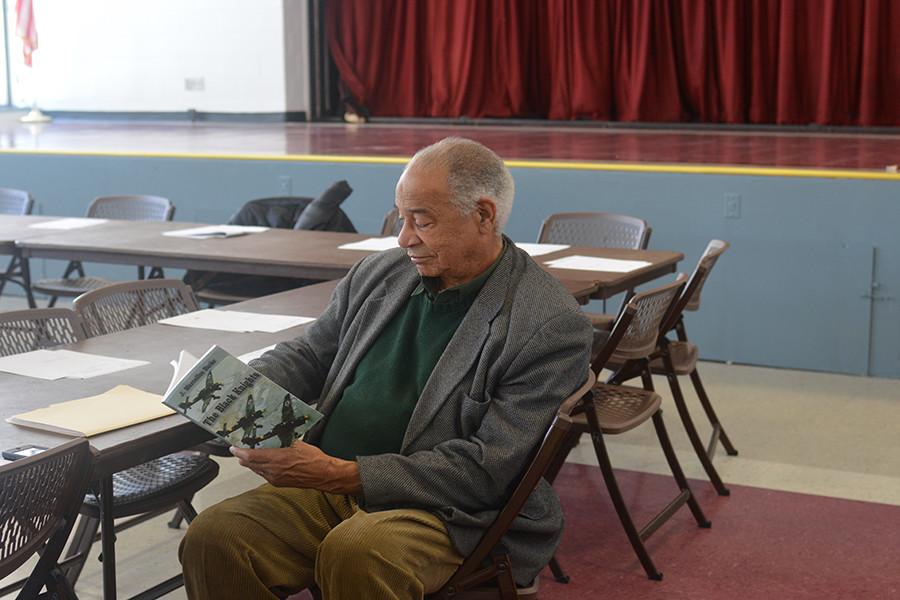Civil rights activist Bennett Johnson reflects on life of service
Nora Shelly/The Daily Northwestern
Bennett Johnson holds “The Black Knights” by J. Marcellus Burke, a book his company, Path Press, published. Johnson is known for working to increase black representation in politics, business and literature.
February 18, 2016
Bennett Johnson said he first encountered discrimination while walking with his sisters from his North Evanston home to elementary school.
Johnson, who went to Foster School, then Noyes Elementary, said his six-year-old self wanted to fight back.
“I thought about it a little … and these kids, they don’t know who black folks are, so I’m going to tell them who we are,” the 86-year-old Evanston resident said.
This incident led Johnson to begin a life dedicated to promoting the political, business and literary power of the black community through his work during the civil rights era and his publishing company Path Press Inc. Johnson was among those who started the Chicago League of Negro Voters in 1958, an independent political organization aimed at supporting black candidates in Chicago elections.
“He was always involved — to me it was just a natural thing,” said Johnson’s sister, Ethelyn Baker. “I imagine it was much later when we realized how bad it was … then we just took it in stride.”
When Johnson was just 12 years old, he joined Evanston’s chapter of the NAACP. In 1945, he and his sister helped found the city’s branch of the Congress of Racial Equality.
Although Johnson fared well at Evanston’s mostly white Haven Middle School, he said he struggled with the racial climate at the more heterogeneous Evanston Township High School. This was a factor in his decision to go to the historically black college Paine College in Augusta, Georgia, he said. There, he played football and began studying chemistry and physics, but transferred after three semesters and moved back to Chicago where he enrolled in Roosevelt University, one of the only schools at the time that did not have enrollment quotas for black or Jewish students.
It was at Roosevelt where Johnson met many of the people he would later work with in his political activism, including future Illinois congressman Gus Savage and Harold Washington, who Johnson was a close advisor for during his political career as a congressman and mayor of Chicago.
“Gus and Harold were like sibling rivals … and I was like the ruffian,” Johnson said.
Johnson, who took a year and half off after catching tuberculosis, later moved to California to finish his education at the University of California, Los Angeles. Although he said the transition was difficult, it was in California where he first met Dr. Martin Luther King Jr. and Ralph Abernathy — King’s friend and a founder of the Southern Christian Leadership Conference — at a NAACP convention in San Francisco in June 1956.
After moving back to the Chicago area the following year, Johnson said he kept in contact with King and Abernathy, and he invited King to Evanston in 1957 to meet with a wealthy couple who had donated money to other civil rights groups. Johnson said he drove King around the city and, surprisingly, lost to him in a game of pool in a billiards room in West Evanston.
Johnson continued to stay in contact with King, and said he he even helped facilitate a meeting between King and Elijah Muhammad, the head of the Nation of Islam.
He said his political activism led him to organize the Chicago League of Negro Voters with other local activists in 1958, an organization Johnson described as aimed at increasing black political power. He served as one of the leaders in a group associated with the League called Protest at the Polls, which Johnson said aligned more closely with civil rights activism and advocated for electing black political officials in the city.
“We had protested in the streets, we had protested in the courts, and now it was time to protest at the polls,” Johnson said.
Johnson’s work at Protest at the Polls was followed with the election of Washington as the first black mayor of Chicago in 1983, an event Johnson said was a key victory.
From then on, Johnson strived not only to increase minority representation in politics, but in business and literature as well. He and his friend Herman Gilbert opened up Path Press Publishing Inc. in the 1960s, after Gilbert’s book, “The Negotiations,” was rejected from another publishing house. Path Press was one of the first black-owned publishing houses.
“We felt there was a need to get the word out for and by African American and Third World people,” he said.
Since then, Johnson has worked for another publishing house, several companies that promote black businesses and was even named an honorary consul general of Uganda for the Midwest in 2008. His consulting work with Urban Consulting Inc. led him to work for Muhammad Ali, the Republic of Lesotho and the city of Chicago.
He did this all while acting as the president of the Evanston Minority Business Consortium, a group that promotes business opportunities for black business owners, and staying involved in city politics. Alderman Delores Holmes (5th), who enlisted Johnson to help with her aldermanic campaigns, said Johnson has been indispensible to the community.
“He definitely has been active all his life,” said Holmes, who has known Johnson since they were children. “He had perspective from different parts of the country, and he shared that with Evanston.”
Twitter: @noracshelly
Email: [email protected]


